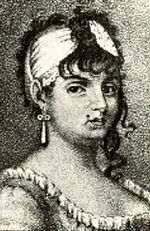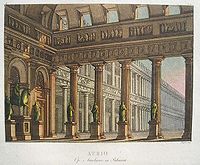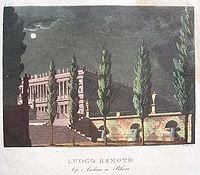
Aureliano in Palmira
Encyclopedia
Aureliano in Palmira is an opera
tic dramma serio in two acts written by Gioachino Rossini to an Italian
libretto
in which the librettist was credited only by the initials "G. F. R." The libretto has generally been attributed to Giuseppe Felice Romani, but sometimes to the otherwise unknown Gian Francesco Romanelli. It has been suggested that the latter name may have resulted from a confusion of Romani with Luigi Romanelli, La Scala's house poet prior to Romani's appointment to the post.
The story was based on the libretto by Gaetano Sertor for Pasquale Anfossi
's 1789 opera Zenobia in Palmira and it centers around the rivalry between the Roman Emperor Aurelian
and Prince Arsace
of Persia over the beautiful Zenobia
, Queen of Palmyra
.
The Act 1 duet between Zenobia and Arsace, Se la m'ami, o mia regina ("If you love me, oh my queen"), was greatly admired by Stendhal
. Although he had never seen a complete performance of Aureliano in Palmira, he heard the duet in a concert in Paris and described its music as "sublime" and one of the best duets that Rossini had written. Other music from this opera, particularly the overture, was later reused by Rossini in Elisabetta, regina d'Inghilterra
and in The Barber of Seville
.
It premiered at La Scala
in Milan
on 26 December 1813.
. It opened the theatre's Carnival
season with the famed castrato
, Giovanni Battista Velluti as Arsace. It was the only role that Rossini wrote for the castrato voice. Rossini had originally written the role of Aureliano for Giovanni David
, one of the most renowned tenors of the day. However, throat problems during rehearsals led David to withdraw from the production, and Luigi Mari took his place. The popular soprano, Lorenza Correa, sang the role of Queen Zenobia. The orchestra at the premiere was conducted by Alessandro Rolla
, with the staging directed by Alessandro Sanquirico.
The opera's opening night proved disappointing to the Milanese critics who praised the production but considered the music inferior to that of Rossini's Tancredi
which had premiered in Venice earlier that year. There was also criticism of the three principal singers. Nevertheless, it had a run of 14 performances at La Scala that season and was performed sporadically in various Italian theatres (including the Teatro di San Carlo
in Naples
) between 1814 and 1831. It was also performed in London in 1826, again with Velluti as Arsace. The opera then fell more or less into obscurity.
Its first modern performance was in September, 1980 at the Teatro Politeama in Genoa
conducted by Giacomo Zani, with Paolo Barbacini as Aureliano, Helga Müller-Molinari as Arsace, and Luciana Serra
as Zenobia. There was another major revival in 1996 at the "Rossini in Wildbad
" Festival conducted by Francesco Corti, with Donald George as Aureliano, Angelo Manzotti
as Arsace, and Tatiana Korovina as Zenobia.


and pray for their deliverance from the approaching Roman army. General Oraspe enters to the strains of martial music
and announces that Aureliano's Roman army is at the gates of Palmyra. Arsace pledges his Persian troops to defend the city. After a dramatic battle scene on the plains outside the city, the Persians are defeated. The Roman soldiers celebrate their victory. Aureliano arrives and addresses Arsace, now a prisoner. He responds to the Emperor with dignity and affirms his love for Zenobia, saying that he is prepared to die for her.
Inside Palmyra's walls, Zenobia has hidden the kingdom's treasures in the vaults beneath the palace. She decides to make a last stand with her troops to save the city. She asks Aureliano for a truce so that she can speak with him and obtain the liberty of the prisoners, including Arsace. On Aureliano's refusal to free the prisoners, she asks to at least see Arsace for a last time. Zenobia and Arsace weep over their fate. Aureliano enters and promises to free Arsace on condition that he abandons Zenobia. Arsace refuses and is sentenced to death. The Roman and Palmyran armies prepare for a last battle.
 Palmyra has now been conquered by the Romans. Aureliano enters Zenobia's palace and offers his love to her, which she refuses. Meanwhile Oraspe frees Arsace who then flees to the hills by the Euphrates
Palmyra has now been conquered by the Romans. Aureliano enters Zenobia's palace and offers his love to her, which she refuses. Meanwhile Oraspe frees Arsace who then flees to the hills by the Euphrates
river where he is sheltered by a group of shepherds. Arsace's soldiers join him and tell him that Zenobia has been taken prisoner. Arsace sets off to free her and launch a new attack against the Romans with the Palmyran troops.
In the palace, Aureliano proposes to Zenobia that they reign together over Palmyra. Once again Zenobia refuses. Later that night, Arsace and Zenobia meet again in the moonlight and embrace. When they are discovered by the Roman troops, they ask to die. Although he secretly admires their courage and devotion to each other, Aureliano decrees that they will end their days in separate cells. Publia, the daughter of Roman general and secretly in love with Arsace, begs Aureliano to take pity on him.
The final scene takes place in a large chamber of Zenobia's palace. The leaders and priests of the defeated Palmyrans are gathered in supplication before Aureliano. Oraspe, Arsace and Zenobia are led into the chamber in chains. Aureliano, has a change of heart and frees Zenobia and Arsace to reign together over Palmyra provided they both swear fealty to the Roman Empire. This they do, and praise Aureliano for his generous heart. The chorus sings joyfully, "Torni sereno a splendere all'Asia afflitta il dì." ("May the day dawn serene and shining for suffering Asia.")
Opera
Opera is an art form in which singers and musicians perform a dramatic work combining text and musical score, usually in a theatrical setting. Opera incorporates many of the elements of spoken theatre, such as acting, scenery, and costumes and sometimes includes dance...
tic dramma serio in two acts written by Gioachino Rossini to an Italian
Italian language
Italian is a Romance language spoken mainly in Europe: Italy, Switzerland, San Marino, Vatican City, by minorities in Malta, Monaco, Croatia, Slovenia, France, Libya, Eritrea, and Somalia, and by immigrant communities in the Americas and Australia...
libretto
Libretto
A libretto is the text used in an extended musical work such as an opera, operetta, masque, oratorio, cantata, or musical. The term "libretto" is also sometimes used to refer to the text of major liturgical works, such as mass, requiem, and sacred cantata, or even the story line of a...
in which the librettist was credited only by the initials "G. F. R." The libretto has generally been attributed to Giuseppe Felice Romani, but sometimes to the otherwise unknown Gian Francesco Romanelli. It has been suggested that the latter name may have resulted from a confusion of Romani with Luigi Romanelli, La Scala's house poet prior to Romani's appointment to the post.
The story was based on the libretto by Gaetano Sertor for Pasquale Anfossi
Pasquale Anfossi
Bonifacio Domenico Pasquale Anfossi was an Italian opera composer. Born in Taggia, Liguria, he studied with Niccolò Piccinni and Antonio Sacchini, and worked mainly in London, Venice and Rome....
's 1789 opera Zenobia in Palmira and it centers around the rivalry between the Roman Emperor Aurelian
Aurelian
Aurelian , was Roman Emperor from 270 to 275. During his reign, he defeated the Alamanni after a devastating war. He also defeated the Goths, Vandals, Juthungi, Sarmatians, and Carpi. Aurelian restored the Empire's eastern provinces after his conquest of the Palmyrene Empire in 273. The following...
and Prince Arsace
Arsaces
Arsaces is the eponymous Greek form of the dynastic name adopted by all epigraphically attested rulers of the 'phil-hellenenic' Arsacid dynasties. The indigenous Parthian and Armenian form was Arshak....
of Persia over the beautiful Zenobia
Zenobia
Zenobia was a 3rd-century Queen of the Palmyrene Empire in Roman Syria. She led a famous revolt against the Roman Empire. The second wife of King Septimius Odaenathus, Zenobia became queen of the Palmyrene Empire following Odaenathus' death in 267...
, Queen of Palmyra
Palmyrene Empire
The Palmyrene Empire was a splinter empire, that broke off of the Roman Empire during the Crisis of the Third Century. It encompassed the Roman provinces of Syria Palaestina, Egypt and large parts of Asia Minor....
.
The Act 1 duet between Zenobia and Arsace, Se la m'ami, o mia regina ("If you love me, oh my queen"), was greatly admired by Stendhal
Stendhal
Marie-Henri Beyle , better known by his pen name Stendhal, was a 19th-century French writer. Known for his acute analysis of his characters' psychology, he is considered one of the earliest and foremost practitioners of realism in his two novels Le Rouge et le Noir and La Chartreuse de Parme...
. Although he had never seen a complete performance of Aureliano in Palmira, he heard the duet in a concert in Paris and described its music as "sublime" and one of the best duets that Rossini had written. Other music from this opera, particularly the overture, was later reused by Rossini in Elisabetta, regina d'Inghilterra
Elisabetta, regina d'Inghilterra
Elisabetta, regina d'Inghilterra, is a dramma per musica or opera in two acts by Gioachino Rossini to a libretto by Giovanni Schmidt, from the play The Page of Leicester by Carlo Federici...
and in The Barber of Seville
The Barber of Seville
The Barber of Seville, or The Futile Precaution is an opera buffa in two acts by Gioachino Rossini with a libretto by Cesare Sterbini. The libretto was based on Pierre Beaumarchais's comedy Le Barbier de Séville , which was originally an opéra comique, or a mixture of spoken play with music...
.
It premiered at La Scala
La Scala
La Scala , is a world renowned opera house in Milan, Italy. The theatre was inaugurated on 3 August 1778 and was originally known as the New Royal-Ducal Theatre at La Scala...
in Milan
Milan
Milan is the second-largest city in Italy and the capital city of the region of Lombardy and of the province of Milan. The city proper has a population of about 1.3 million, while its urban area, roughly coinciding with its administrative province and the bordering Province of Monza and Brianza ,...
on 26 December 1813.
Performance history
Aureliano in Palimira was Rossini's second commission from La ScalaLa Scala
La Scala , is a world renowned opera house in Milan, Italy. The theatre was inaugurated on 3 August 1778 and was originally known as the New Royal-Ducal Theatre at La Scala...
. It opened the theatre's Carnival
Carnival
Carnaval is a festive season which occurs immediately before Lent; the main events are usually during February. Carnaval typically involves a public celebration or parade combining some elements of a circus, mask and public street party...
season with the famed castrato
Castrato
A castrato is a man with a singing voice equivalent to that of a soprano, mezzo-soprano, or contralto voice produced either by castration of the singer before puberty or one who, because of an endocrinological condition, never reaches sexual maturity.Castration before puberty prevents a boy's...
, Giovanni Battista Velluti as Arsace. It was the only role that Rossini wrote for the castrato voice. Rossini had originally written the role of Aureliano for Giovanni David
Giovanni David
Giovanni David was an Italian tenor particularly known for his roles in Rossini operas....
, one of the most renowned tenors of the day. However, throat problems during rehearsals led David to withdraw from the production, and Luigi Mari took his place. The popular soprano, Lorenza Correa, sang the role of Queen Zenobia. The orchestra at the premiere was conducted by Alessandro Rolla
Alessandro Rolla
Alessandro Rolla was widely acknowledged in his time as a violin and, especially, viola virtuoso, composer and teacher. His contribution to technique, repertoire and history of music is greatly underestimated...
, with the staging directed by Alessandro Sanquirico.
The opera's opening night proved disappointing to the Milanese critics who praised the production but considered the music inferior to that of Rossini's Tancredi
Tancredi
Tancredi is a melodramma eroico in two acts by composer Gioachino Rossini and librettist Gaetano Rossi, based on Voltaire's play Tancrède...
which had premiered in Venice earlier that year. There was also criticism of the three principal singers. Nevertheless, it had a run of 14 performances at La Scala that season and was performed sporadically in various Italian theatres (including the Teatro di San Carlo
Teatro di San Carlo
The Real Teatro di San Carlo is an opera house in Naples, Italy. It is the oldest continuously active such venue in Europe.Founded by the Bourbon Charles VII of Naples of the Spanish branch of the dynasty, the theatre was inaugurated on 4 November 1737 — the king's name day — with a performance...
in Naples
Naples
Naples is a city in Southern Italy, situated on the country's west coast by the Gulf of Naples. Lying between two notable volcanic regions, Mount Vesuvius and the Phlegraean Fields, it is the capital of the region of Campania and of the province of Naples...
) between 1814 and 1831. It was also performed in London in 1826, again with Velluti as Arsace. The opera then fell more or less into obscurity.
Its first modern performance was in September, 1980 at the Teatro Politeama in Genoa
Genoa
Genoa |Ligurian]] Zena ; Latin and, archaically, English Genua) is a city and an important seaport in northern Italy, the capital of the Province of Genoa and of the region of Liguria....
conducted by Giacomo Zani, with Paolo Barbacini as Aureliano, Helga Müller-Molinari as Arsace, and Luciana Serra
Luciana Serra
Luciana Serra is an Italian soprano.-Debuts:Serra made her international debut in 1966 at the Hungarian State Opera House in Budapest, but did not achieve general acclaim until the late 1970s, when she took on coloratura roles in Donizetti's Lucia di Lammermoor and Bellini's La sonnambula...
as Zenobia. There was another major revival in 1996 at the "Rossini in Wildbad
Bad Wildbad
Bad Wildbad is a town in Germany, in the state of Baden-Württemberg. It is located in the government district of Karlsruhe and in the district of Calw. Its coordinates are 48° 45' N, 8° 33' E. About 11,250 people live there...
" Festival conducted by Francesco Corti, with Donald George as Aureliano, Angelo Manzotti
Angelo Manzotti
Angelo Manzotti is an Italian countertenor or sopranist born in 1971 in Marmirolo, Italy.He began singing in the falsetto register at the age of twelve. He studied at the Accademia Rossiniana in Pesaro and made his debut in August 1989 at the Rossini Opera Festival there...
as Arsace, and Tatiana Korovina as Zenobia.
Roles

| Role | Voice type | (Conductor: Alessandro Rolla) |
|---|---|---|
| Aureliano Aurelian Aurelian , was Roman Emperor from 270 to 275. During his reign, he defeated the Alamanni after a devastating war. He also defeated the Goths, Vandals, Juthungi, Sarmatians, and Carpi. Aurelian restored the Empire's eastern provinces after his conquest of the Palmyrene Empire in 273. The following... , Emperor of Rome |
tenor Tenor The tenor is a type of male singing voice and is the highest male voice within the modal register. The typical tenor voice lies between C3, the C one octave below middle C, to the A above middle C in choral music, and up to high C in solo work. The low extreme for tenors is roughly B2... |
Luigi Mari |
| Zenobia Zenobia Zenobia was a 3rd-century Queen of the Palmyrene Empire in Roman Syria. She led a famous revolt against the Roman Empire. The second wife of King Septimius Odaenathus, Zenobia became queen of the Palmyrene Empire following Odaenathus' death in 267... , Queen of Palmyra, |
soprano Soprano A soprano is a voice type with a vocal range from approximately middle C to "high A" in choral music, or to "soprano C" or higher in operatic music. In four-part chorale style harmony, the soprano takes the highest part, which usually encompasses the melody... |
Lorenza Corrèa |
| Arsace, Prince of Persia | castrato Castrato A castrato is a man with a singing voice equivalent to that of a soprano, mezzo-soprano, or contralto voice produced either by castration of the singer before puberty or one who, because of an endocrinological condition, never reaches sexual maturity.Castration before puberty prevents a boy's... / contralto Contralto Contralto is the deepest female classical singing voice, with the lowest tessitura, falling between tenor and mezzo-soprano. It typically ranges between the F below middle C to the second G above middle C , although at the extremes some voices can reach the E below middle C or the second B above... |
Giambattista Velluti |
| Publia, Valeriano's daughter, secretly in love with Arsace |
mezzo-soprano Mezzo-soprano A mezzo-soprano is a type of classical female singing voice whose range lies between the soprano and the contralto singing voices, usually extending from the A below middle C to the A two octaves above... |
Luigia Sorrentini |
| Oraspe, Palmyran army general | tenor | Gaetano Pozzi |
| Licinio, a tribune | bass | Pietro Vasoli |
| Il Gran Sacerdote (High Priest) | bass | Vincenzo Botticelli |
| Priests, Palmyran maidens, Palmyran, Persian, and Roman soldiers; shepherds and shepherdesses; Roman, Palmyran, Persian soldiers | ||
Synopsis

- Place: in and around the city of PalmyraPalmyraPalmyra was an ancient city in Syria. In the age of antiquity, it was an important city of central Syria, located in an oasis 215 km northeast of Damascus and 180 km southwest of the Euphrates at Deir ez-Zor. It had long been a vital caravan city for travellers crossing the Syrian desert...
- Time: 271-272 A.D.
Act 1
Queen Zenobia, her lover Arsace, and the priests offer sacrifices in the Temple of IsisIsis
Isis or in original more likely Aset is a goddess in Ancient Egyptian religious beliefs, whose worship spread throughout the Greco-Roman world. She was worshipped as the ideal mother and wife as well as the matron of nature and magic...
and pray for their deliverance from the approaching Roman army. General Oraspe enters to the strains of martial music
March (music)
A march, as a musical genre, is a piece of music with a strong regular rhythm which in origin was expressly written for marching to and most frequently performed by a military band. In mood, marches range from the moving death march in Wagner's Götterdämmerung to the brisk military marches of John...
and announces that Aureliano's Roman army is at the gates of Palmyra. Arsace pledges his Persian troops to defend the city. After a dramatic battle scene on the plains outside the city, the Persians are defeated. The Roman soldiers celebrate their victory. Aureliano arrives and addresses Arsace, now a prisoner. He responds to the Emperor with dignity and affirms his love for Zenobia, saying that he is prepared to die for her.
Inside Palmyra's walls, Zenobia has hidden the kingdom's treasures in the vaults beneath the palace. She decides to make a last stand with her troops to save the city. She asks Aureliano for a truce so that she can speak with him and obtain the liberty of the prisoners, including Arsace. On Aureliano's refusal to free the prisoners, she asks to at least see Arsace for a last time. Zenobia and Arsace weep over their fate. Aureliano enters and promises to free Arsace on condition that he abandons Zenobia. Arsace refuses and is sentenced to death. The Roman and Palmyran armies prepare for a last battle.
Act 2

Euphrates
The Euphrates is the longest and one of the most historically important rivers of Western Asia. Together with the Tigris, it is one of the two defining rivers of Mesopotamia...
river where he is sheltered by a group of shepherds. Arsace's soldiers join him and tell him that Zenobia has been taken prisoner. Arsace sets off to free her and launch a new attack against the Romans with the Palmyran troops.
In the palace, Aureliano proposes to Zenobia that they reign together over Palmyra. Once again Zenobia refuses. Later that night, Arsace and Zenobia meet again in the moonlight and embrace. When they are discovered by the Roman troops, they ask to die. Although he secretly admires their courage and devotion to each other, Aureliano decrees that they will end their days in separate cells. Publia, the daughter of Roman general and secretly in love with Arsace, begs Aureliano to take pity on him.
The final scene takes place in a large chamber of Zenobia's palace. The leaders and priests of the defeated Palmyrans are gathered in supplication before Aureliano. Oraspe, Arsace and Zenobia are led into the chamber in chains. Aureliano, has a change of heart and frees Zenobia and Arsace to reign together over Palmyra provided they both swear fealty to the Roman Empire. This they do, and praise Aureliano for his generous heart. The chorus sings joyfully, "Torni sereno a splendere all'Asia afflitta il dì." ("May the day dawn serene and shining for suffering Asia.")
Recordings
| Year | Cast: Aureliano, Zenobia, Arsace, Gran Sacerdote |
Conductor, Opera House and Orchestra |
Label |
|---|---|---|---|
| 1981 | Paolo Barbacini, Luciana Serra Luciana Serra Luciana Serra is an Italian soprano.-Debuts:Serra made her international debut in 1966 at the Hungarian State Opera House in Budapest, but did not achieve general acclaim until the late 1970s, when she took on coloratura roles in Donizetti's Lucia di Lammermoor and Bellini's La sonnambula... , Helga Müller-Molinari, Carlo Cava |
Giacomo Zani, Orchestra of the Teatro dell'Opera Giocosa di Genova and the Gregorio Magno Chorus |
Audio CD: Sarx ANG Cat: 97001 |
| 1996 | Donald George, Tatiana Korovina, Angelo Manzotti, Alexander Alnicolli |
Francesco Corti, I Virtuosi di Praga orchestra and the Czech Chamber Chorus (Live recording from the "Rossini in Wildbad" Festival) |
Audio CD: Bongiovanni Cat: GB 2201/2-2 |

